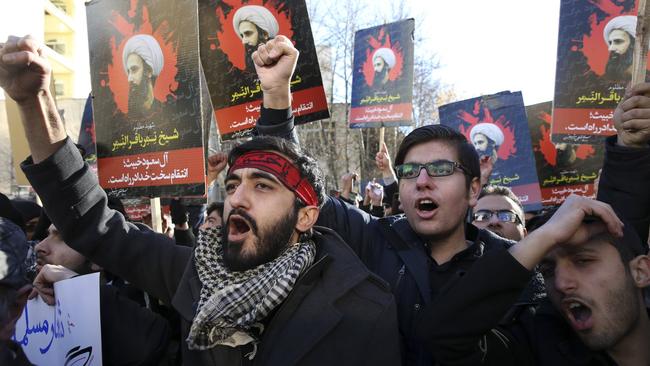
Photo Courtesy of LA Times
United States must end military alliance with Saudi Arabia
Iran and Saudi Arabia are the only two countries that have been internally stable, unified under nationalism and strong governments. However, with the Saudi execution of a prominent Shiite cleric, following with Iranian protesters storming the Saudi embassy in Tehran, the two nations are tinkering on the edge of war when Saudi Arabia decided to cut diplomatic ties with Iran.
Many eyes are looking at the United States on whether or not they will come to the aid of Saudi Arabia. However, U.S involvement could destroy the remaining stability the Middle East needs. To prevent the instability from getting worse, the United States needs to end its military ties with Saudi Arabia, which has incited these conflicts against Iran.
The United States and Saudi Arabia have been strong allies since the Cold War, united under anti-Soviet ideology, even arming the mujaheddin, who fought the Soviets in Afghanistan. However, the Soviet Union has been long gone for over 24 years, so there is no need for a military alliance anymore. The main reason the U.S. militarily supports Saudi Arabia is because of their oil exports. While most of the oil in the U.S. is imported from Canada, Saudi Arabia is not too far behind. Although Saudi Arabia may cut oil export to the United States if military support is no longer offered, the missing void can be remedied by increasing oil independence.
The United States and Saudi Arabia preach different values, but still back each other up. On the other hand, the United States has kicked Iran to the curb despite the similar views and have done no harm to the United States but the same cannot be said about Saudi Arabia. Saudi Arabia recently lifted a ban on women’s suffrage, while Iran has legalized women’s suffrage since 1963. Saudi Arabia is ruled by a king with near-absolute power, while Iran is ruled by an unelectable Supreme Leader, or Ayatollah, and by an elected president and legislature. Prior to the Iran Nuclear Deal, we have frozen Iran’s assets due to students overtaking the U.S. embassy and labelled Iran as an Axis of Evil for allegedly supporting terrorism; however, when 15 out of 19 people who committed the 9/11 attacks were Saudi nationals and the Saudi government ignored Saudi-based charities and individuals funding Al Qaeda, nothing was ever done.
Since the Iran Nuclear Deal, we have established better relations with Iran, and implementation day has brought strong promises of better economic ties with the country. However, this has not been sitting well with Saudi Arabia as they have begun enacting policies that could cause a rift in the region. They have increased aggression in the Yemeni Civil War and executed a prominent Shiite cleric, knowing it would set Iran and other neighboring states off. Saudi Arabia has become far more aggressive than we would like them to be, and with the execution of the Shiite cleric, they may drag us into war. Since the United States is already engaged in the fight against the Islamic State of Iraq and Syria, we cannot afford to have another conflict on our hands.
In the Middle East, there are multiple alliances, with multiples interests and multiple values. With such a tangled web of conflicting ideas, it is best for the United States to stay out of the conflicts in the region, especially Saudi Arabia, since they are the ones provoking these conflicts in the first place. Former president George Washington warned us about these scenarios, and it is a warning we must heed today.
“The great rule of conduct for us, in regard to foreign nations, is in extending our commercial relations, to have with them as little political connection as possible,” Washington said in his Farewell Address.